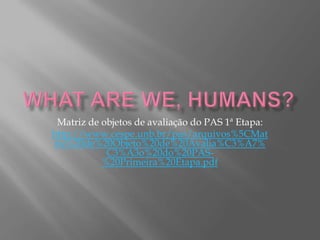
PAS 1st Stage Evaluation Matrix Objects: CESPE
- 1. Matriz de objetos de avaliação do PAS 1ª Etapa: http://www.cespe.unb.br/pas/arquivos%5CMat riz%20de%20Objeto%20de%20Avalia%C3%A7% C3%A3o%20do%20PAS- %20Primeira%20Etapa.pdf
- 2. Grup work: Groups of 3 or 4 students. The Human Being axles: 1.1 - NATURE AND CULTURE 1.2 - BODY AND PSYCHISM Topics and skills to be developed by the students: a) Distinguish between the concepts of nature and culture; b) Understand the notion of culture as essential to the definition of human c) Understand that, in humans, the biological characteristics of nature and cultural data are deeply associated.
- 3. Answer the following questions: 1 - What distinguishes humans from other animals? 2 - What approaches humans from other animals? 3 - Is there a human nature? A human essence? In humans, is it possible to distinguish what is natural from what is cultural? 4 – Can human groups take advantage of natural resources without thinking of its limits? 5 - Should laws be applied to all individuals equally, without regard to the differences of the natural environments in which they live? Or without taking into account the cultural particularities in which they were educated?
- 4. Research animals with human behaviours. Ex.: Birds that can speak and sing, gorilas that use sign language, dolfins that comunicate to humans...